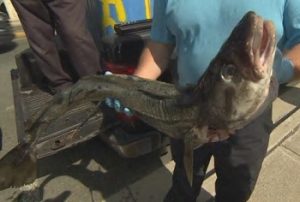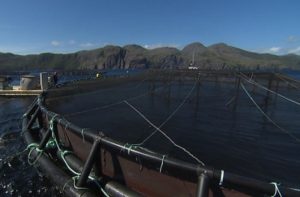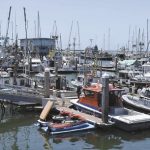Daily Archives: December 26, 2014
No endangered listing for prized pinto abalone
 The National Marine Fisheries Service has declined to list a prized 6-inch Pacific Ocean marine snail as an endangered or threatened species. The mollusks need federal protection because their populations have plummeted from 80 to 99 percent in much of their range, according to the and the Center for Biological Diversity. “These are species that science shows ocean acidification and climate change are going to do it in,” he (Brad Sewell, a senior attorney for Natural Resources Defense Council) said. Shut up. Read the rest here 21:36
The National Marine Fisheries Service has declined to list a prized 6-inch Pacific Ocean marine snail as an endangered or threatened species. The mollusks need federal protection because their populations have plummeted from 80 to 99 percent in much of their range, according to the and the Center for Biological Diversity. “These are species that science shows ocean acidification and climate change are going to do it in,” he (Brad Sewell, a senior attorney for Natural Resources Defense Council) said. Shut up. Read the rest here 21:36
American Samoa tuna cannery gets $70 million from Bellevue company

A Washington state company is making a $70 million investment in a tuna cannery in the U.S. territory of American Samoa. The products from American Samoa will carry the “Made In USA” label, said officials with Bellevue-based Tri Marine International. The company took over the lease of a government property three years ago after another cannery closed. Tri Marine’s plant is expected to employ some 1,500 workers when fully operational and is operated by the company’s , which is in the seaside village of Atu’u. Read the rest here 20:17
Bering Sea/ Aleutian Islands Bycatch debate far from being finished – and other news
Bering Sea halibut fishermen narrowly missed getting a reduction of trawl bycatch at the latest  meeting after a tied vote on a petition for emergency action by the state of Alaska. At issue are the drastic cuts being made to the directed halibut fishery in the Bering Sea and the lack of similar cuts to the bycatch mortality by trawlers. That is not the end of it, however. Read the rest here 19:05
meeting after a tied vote on a petition for emergency action by the state of Alaska. At issue are the drastic cuts being made to the directed halibut fishery in the Bering Sea and the lack of similar cuts to the bycatch mortality by trawlers. That is not the end of it, however. Read the rest here 19:05
Cook Inlet fish wars dominate headlines again in 2014
 The Upper Cook Inlet fisheries were tense in 2014, with an emotional Board of Fisheries meeting in the winter and new restrictions in the summer. Alaska’s Board of Fisheries met in Anchorage in late January and early February to discuss management plans for Upper Cook Inlet. By the end of the two-week meeting, the board for the first time approved changes that paired restrictions for sport and commercial fishermen. Read the rest here 17:07
The Upper Cook Inlet fisheries were tense in 2014, with an emotional Board of Fisheries meeting in the winter and new restrictions in the summer. Alaska’s Board of Fisheries met in Anchorage in late January and early February to discuss management plans for Upper Cook Inlet. By the end of the two-week meeting, the board for the first time approved changes that paired restrictions for sport and commercial fishermen. Read the rest here 17:07
Sabine’s excuse for using modeled data over real data? – ‘earlier data is not of “sufficient quality.”‘
 WUWT reader Peter Gadiel writes: After reading of the critique of Sabine’s exclusion of the historical data on ocean acidification I emailed him. I thought his response might be of interest to you at WUWT. He says the earlier data is not of “sufficient quality.” My question to him: “As a taxpayer who is helping to pay your salary I’d like to know why you are refusing to include all the data on ocean acidification that is available.” For his response, Read the rest here 16:23
WUWT reader Peter Gadiel writes: After reading of the critique of Sabine’s exclusion of the historical data on ocean acidification I emailed him. I thought his response might be of interest to you at WUWT. He says the earlier data is not of “sufficient quality.” My question to him: “As a taxpayer who is helping to pay your salary I’d like to know why you are refusing to include all the data on ocean acidification that is available.” For his response, Read the rest here 16:23
An Opinion – How “Jaws” ruined everything for great white sharks
 Christopher Neff, a lecturer in public policy at the University of Sydney, has been documenting the impacts of a more insidiously influential film: “Jaws,” (is that really a job?) “Jaws,” the 1975 classic that taught the world to fear the boat-stalking, man-eating “rogue shark.” Because, convincing as those ’70s-era special effects are, Neff argues that we’ve had a tough time distinguishing the fictional movie beast from the real thing. In truth, he says, no great white shark has ever acted like the one that terrorizes Amity Island. Read the rest here 15:53
Christopher Neff, a lecturer in public policy at the University of Sydney, has been documenting the impacts of a more insidiously influential film: “Jaws,” (is that really a job?) “Jaws,” the 1975 classic that taught the world to fear the boat-stalking, man-eating “rogue shark.” Because, convincing as those ’70s-era special effects are, Neff argues that we’ve had a tough time distinguishing the fictional movie beast from the real thing. In truth, he says, no great white shark has ever acted like the one that terrorizes Amity Island. Read the rest here 15:53
Fish Skin Art Combines Past with Present
 Native Alaskans and other people of the north have tanned fish skins for centuries to make bags, shoes, and other useful items. Now fish skin leather is appearing on high-end products from Prada, Nike, and Dior. Commercially produced salmon leather is made in mass in Europe and Chile, but in Alaska, it’s still made by hand, one fish at time. Read the rest here 15:20
Native Alaskans and other people of the north have tanned fish skins for centuries to make bags, shoes, and other useful items. Now fish skin leather is appearing on high-end products from Prada, Nike, and Dior. Commercially produced salmon leather is made in mass in Europe and Chile, but in Alaska, it’s still made by hand, one fish at time. Read the rest here 15:20
Fight looming over New England fishing territory
 Scientists awaiting a long-anticipated fishery management plan in New England waters are concerned federal regulators won’t take aggressive enough steps to protect the habitat. The New England Fishery Management Council has been working for several years on a for federal waters from Maine to Rhode Island and is considering a host of options to balance conservation with commercial fishing interests. Read the rest here 11:31
Scientists awaiting a long-anticipated fishery management plan in New England waters are concerned federal regulators won’t take aggressive enough steps to protect the habitat. The New England Fishery Management Council has been working for several years on a for federal waters from Maine to Rhode Island and is considering a host of options to balance conservation with commercial fishing interests. Read the rest here 11:31









































